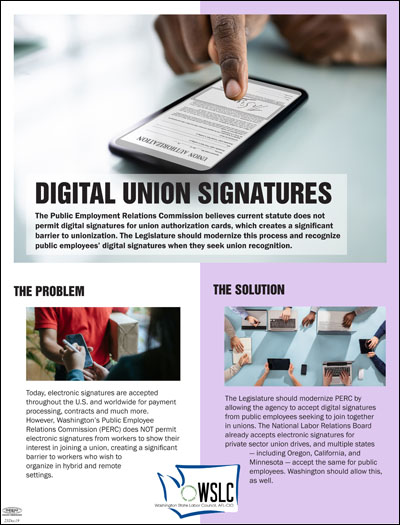STATE GOVERNMENT
Bill would allow digital union signatures for public employees
OLYMPIA (Jan. 18, 2024) — The Senate Labor and Commerce Committee held a public hearing this week on SB 6060, which would modernize the state’s Public Employment Relations Commission by allowing the agency to accept digital signatures from public employees seeking to join together in unions.
 The National Labor Relations Board (NLRB) already accepts electronic signatures for private sector union drives, and multiple states — including Oregon, California, and Minnesota — accept the same for public employees. Sponsored by Sen. Joe Nguyen (D-White Center), SB 6060 would add Washington to the growing list of states to do so.
The National Labor Relations Board (NLRB) already accepts electronic signatures for private sector union drives, and multiple states — including Oregon, California, and Minnesota — accept the same for public employees. Sponsored by Sen. Joe Nguyen (D-White Center), SB 6060 would add Washington to the growing list of states to do so.
“Being able to bring this level of modernization to our public employees is important,” Nguyen said at Tuesday’s hearing. “(Passing SB 6060) will remove unnecessary barriers and uphold the rights of our workers in general. This legislation is about efficiency, equality, and empowerment. By adopting electronic signatures, we can ensure that no worker is disenfranchised due to logistical hurdles.”
Ivan Cruz of UAW 4121 explained to committee members about the challenges faced by University of Washington research scientists spread across the state — and world — when they sought to form a union.
“All workers deserve good working conditions and the protections that a union provides,” Cruz said. “The option of electronically signing a card will make the process more accessible to workforces like research scientists who are distributed across the globe. As a public sector workers in Washington state, we need the same ability to democratically decide to form a labor union and utilize technology in the same way our private sector colleagues can.”
 SB 6060 allowing digital union signatures is among the priority legislation in the Washington State Labor Council’s 2024 Legislative Agenda.
SB 6060 allowing digital union signatures is among the priority legislation in the Washington State Labor Council’s 2024 Legislative Agenda.
Here is an excerpt from the WSLC’s fact-sheet on SB 6060:
Today, electronic signatures are accepted throughout the U.S. and worldwide for payment processing, contracts and much more. However, PERC does NOT permit electronic signatures from workers to show their interest in joining a union, creating a significant barrier to workers who wish to organize in hybrid and remote settings.
Under PERC’s current interpretation of law, PERC accepts a worker’s showing of interest ONLY with a physical signature, which it then checks, or verifies, against employer records.
PERC’s process diverges from federal NLRB practice, which has allowed workers to express interest in unionization via electronic signatures since 2015. California, Oregon, and Minnesota have since followed suit for workers governed by their public employee labor relations bodies.
The NLRB and other states have made safe the acceptance of workers’ electronic signatures by building verifications into the process. Under the NLRB, submissions supported by electronic signatures must include the signer’s name, email, phone, and more for verification; California includes these items and requires a receipt be sent to the worker of their showing of interest in joining a union. The party which files these showings of interest (usually a union) must include a declaration explaining which digital signature technology was used and background on the security features of that technology.
In 2020, the Washington State Legislature passed the Uniform Electronic Transactions Act (ESSB 6028) which, in part, clarifies and facilitates acceptance of electronic signatures. Despite this, and the processes enacted by the NLRB and other states, PERC believes current statute does not allow for electronic signatures.
SB 6060 will correct that.
Ultimately, allowing organizing workers to submit their electronic signature to show interest in joining a union, with verification, recognizes and accounts for the barriers posed by today’s hybrid and remote workplaces.





